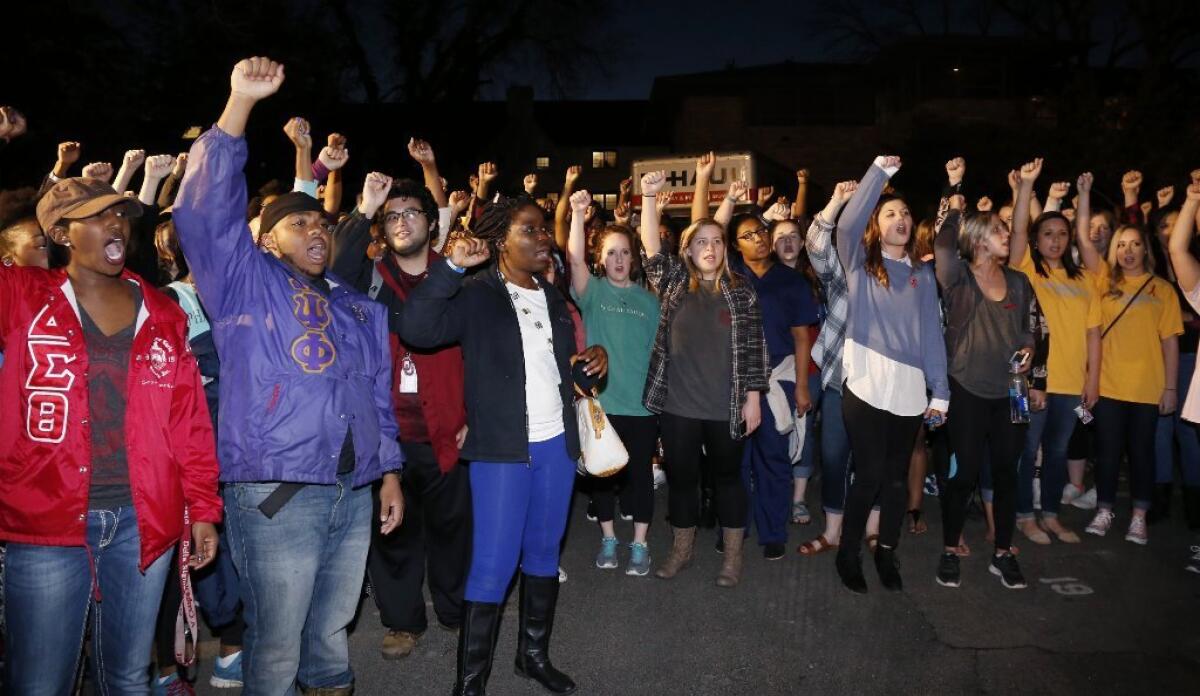Racist fraternity chant may not be limited to University of Oklahoma

- Share via
Reporting from Norman, Okla. — Days after the University of Oklahoma ousted Sigma Alpha Epsilon from its campus following a viral video of members singing a racist chant, national fraternity leaders were investigating reports that the words have been sung by members of other chapters.
The University of Texas said in a statement that it was looking into claims that its SAE chapter had used the chant.
“Rumors also are circulating that a chant similar to the one at OU has been traditional in the UT chapter of SAE,” University of Texas at Austin President Bill Powers said, noting that the university’s dean of students is “looking into this matter.”
SAE national leaders said they were investigating “several other incidents with chapters or members” using the song.
University of Oklahoma officials swiftly expelled SAE members Parker Rice and Levi Pettit this week after identifying them from a video as leaders of the chant, singing, “There will never be a ... SAE.” The chant also alluded to lynching black people.
Both students, who are from Texas, apologized in public statements Tuesday, and one sentence in Rice’s apology raised eyebrows: “Yes, the song was taught to us.”
But by whom?
In a statement, the national SAE headquarters responded to Rice’s remark: “The national fraternity does not teach such a racist, hateful chant, and this chant is not part of any education or training.
“Our investigation has found very likely that the men learned the song from fellow chapter members, which reiterates why Sigma Alpha Epsilon did not hesitate to close the chapter completely because of the culture that may have been fostered in the group,” the SAE statement said.
The culture of insularity that typically shrouds many college fraternities, especially during controversial episodes, makes it difficult to know exactly how widespread the chant is — perhaps even for the fraternity’s national leadership.
But social media this week have offered possible glimpses through the veil, suggesting the chant was not an isolated practice.
“I was an SAE at a university in Texas from 2000-2004. The exact same chant was often used then. This is not isolated,” one Twitter user wrote in a tweet that is no longer publicly viewable.
One of the most damning posts on social media was published weeks before the incident, when a Reddit user wrote the racist lyrics in a comment about a fraternity at the University of Texas, adding that his friends in an SAE chapter called it “their favorite song to sing.”
That appears to be the post that has caught the attention of University of Texas officials. The Reddit user has since deleted the post.
The questions about the chant have come amid an increasingly tense atmosphere on Oklahoma’s campus, where a large percentage of students belong to fraternities and sororities.
Tyrone Speller, president of the University of Oklahoma’s Phi Delta Theta chapter, said in a statement Wednesday that the tires of students affiliated with Greek houses have been slashed in recent days and that “indiscriminate threats of violence” have been made toward Greek members.
Earlier this week, the stately mansion that housed SAE was marred by a giant spray-painted message: “Tear it down.”
Speller said the property of other Greek houses and members have also been vandalized.
“When students feel hurt,” Speller said, “they should not turn around and do the same thing in response.... You cannot fight hate with hate.”
Speller, who is black, lamented the divisions on campus, saying that though he was “a person of color in a predominantly white fraternity,” he was always welcomed by his fraternity brothers.
He noted that members of multicultural groups participate alongside fraternities and sororities in university activities, including homecoming, intramural sports and fundraisers.
“People need to realize that this is not a ‘minorities’ vs. the ‘Greeks’ battle,” Speller wrote. “This is not a choice between two competing cultures.
“We are one student body. The Greek and African American aspects of my life should not be difficult to balance.”
At the Fast Lane Supercenter, a gas station and car wash near campus, Kenneth Dennis said people in town are nervous to say much about the controversy surrounding the university that plays such a big role in Norman life.
University of Oklahoma Sooner license plates or decals seem to be affixed to every other car, he said.
On Wednesday, the station was busy — but quiet.
“It’s really tense out here,” said Dennis, a University of Oklahoma graduate.
hailey.branson@latimes.com
nigel.duara@latimes.com
matt.pearce@latimes.com
Times staff writers Branson-Potts and Pearce reported from Los Angeles; Duara reported from Norman, Okla.
More to Read
Sign up for Essential California
The most important California stories and recommendations in your inbox every morning.
You may occasionally receive promotional content from the Los Angeles Times.















